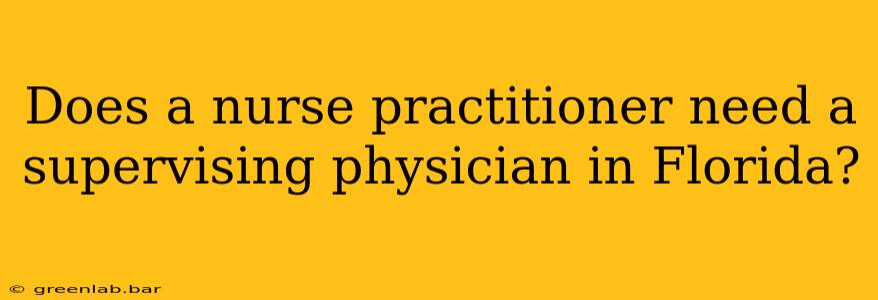The question of whether a Nurse Practitioner (NP) in Florida requires a supervising physician is complex and depends on several factors. The short answer is not always. Florida law has undergone significant changes regarding the practice authority of NPs, granting them more autonomy than in many other states. However, the specifics are crucial to understand.
The Evolution of NP Practice Authority in Florida
For many years, Florida NPs operated under a collaborative practice model, requiring supervision or collaboration with a physician. This often meant needing a physician to sign off on certain procedures or review patient charts. However, recent legislative changes have significantly altered this landscape.
Current Regulations: The Key is "Full Practice Authority"
The key term to understand is full practice authority. While not all NPs in Florida have full practice authority, a significant number do. This means they can practice independently, without the direct supervision of a physician. They can assess patients, diagnose illnesses, order and interpret tests, and prescribe medications without physician oversight.
Factors Determining Supervision Requirements:
Several factors influence whether a Florida NP needs a supervising physician:
- Type of Practice Setting: The setting in which an NP works can dictate their level of independence. Some healthcare systems might maintain collaborative agreements, even if legally not required.
- Specific NP's Credentials and Experience: The amount of training, experience, and certifications an NP possesses can impact their ability to practice independently. Some specialized certifications may allow for greater autonomy.
- Specific Procedures and Treatments: Some particularly complex procedures or treatments might still require physician consultation or supervision, even for NPs with full practice authority. This varies based on the procedure's risk and complexity.
- Individual Agreements: Though not legally mandated in all cases, some NPs might choose to maintain a collaborative relationship with a physician for professional consultation or mentorship.
Understanding the Nuances: Collaboration vs. Supervision
It's crucial to distinguish between collaboration and supervision. While Florida legislation increasingly allows for independent practice, collaboration is often encouraged. This means working alongside physicians for consultation and leveraging their expertise, but not necessarily requiring direct supervision. The collaborative model promotes shared decision-making and patient care.
Finding Reliable Information:
For the most up-to-date and accurate information on NP practice authority in Florida, you should consult the following resources:
- Florida Board of Nursing: The official website for the Florida Board of Nursing provides the latest regulations and rules governing the practice of NPs.
- Florida Statutes: The relevant Florida Statutes detailing NP practice authority are another essential source of reliable information.
Conclusion:
The landscape of NP practice authority in Florida is dynamic and evolving. While the trend is towards granting NPs greater autonomy and full practice authority, specific circumstances will determine whether supervision from a physician is legally required. Always consult the official sources mentioned above for the most accurate, current information applicable to your situation. This information should not be considered legal advice and is for informational purposes only. If you have specific questions regarding your situation, it's recommended to consult with a legal professional specializing in healthcare law.

